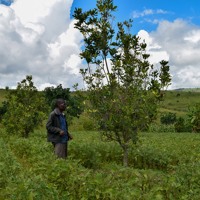

You can purchase certificates here which are used to fund smallholder farmers in Malawi to plant and maintain macadamia trees. The trees are surveyed and then allocated to certificates registering amounts of CO2 sequestered by trees.
We use an average U.K. citizen CO2 emission value of approximately 5 tonnes CO2 per person per year.
For extensive information about carbon footprints see International CO2 emissions (OurWorldInData) data.
Carbon values are rounded to the nearest 0.02 tCO2 which caters for the units we use in our allocation to trees.




Macadamia trees produce very nutritious nuts having a high content of healthy mono-unsaturated oils. The trees planted by the smallholder farmers we support help stabilise and increase the biodiversity of their environments which are vulnerable to deforestation.
Read Article
In order to bridge the gap between planting macadamia and it's production of nuts interim activities have been developed. Training and resources have been provided for bee keeping.
Read Article
In Malawi macadamia nuts ripen during the main rains in January and February. When ripe, the nuts turn brown within the husk, and drop naturally to the ground. Harvesting or gathering the fallen nuts takes place frequently to avoid pest damage.
Read Article NMT works with smallholder farmer co-operatives in Malawi to support sustainable macadamia farming.
NMT works with smallholder farmer co-operatives in Malawi to support sustainable macadamia farming.
We call it Climate Smart Macadamia Agroforestry.
This is farming traditional ground crops (such as maize, cassava, sweet potato) intercropped with the macadamia trees to provide better food security for smallholders whose environment is continually at risk of climate shocks that create food shortages (see our news pages of 2019 and 2022).
Our main partner organisation in Malawi is the Highland Macadamia Co-operative Union Limited - HIMACUL. Through HIMACUL, NMT supports district level primary co-operatives, business centres and the co-operative farmer members. Our current focus is the support of macadamia tree nurseries, tree planting, strengthening co-operatives.
Our funding support is derived from personal and business one-off and recurring donations, small scale grants and Carbon Damage Mitigation Certificate (CDMCs) payments.
Our charity objective is the alleviation of poverty and the improvement of the conditions of life in socially and economically disadvantaged communities, in particular Neno and the adjacent districts in Malawi, Africa. In doing so we aim to support farmers in their own initiative. The primary focus is supporting the developing macadamia nut growing industry. Other activities include trade skills training.
Our priority is to support smallholder farmers adapting to climate change through macadamia agroforestry, enabling income generation, improving nutrition and to increase their resilience to unpredictable climate shocks. Macadamia agroforestry recovers the land from deforestation, regenerating the sustainability of the ecosystem and increases food security.